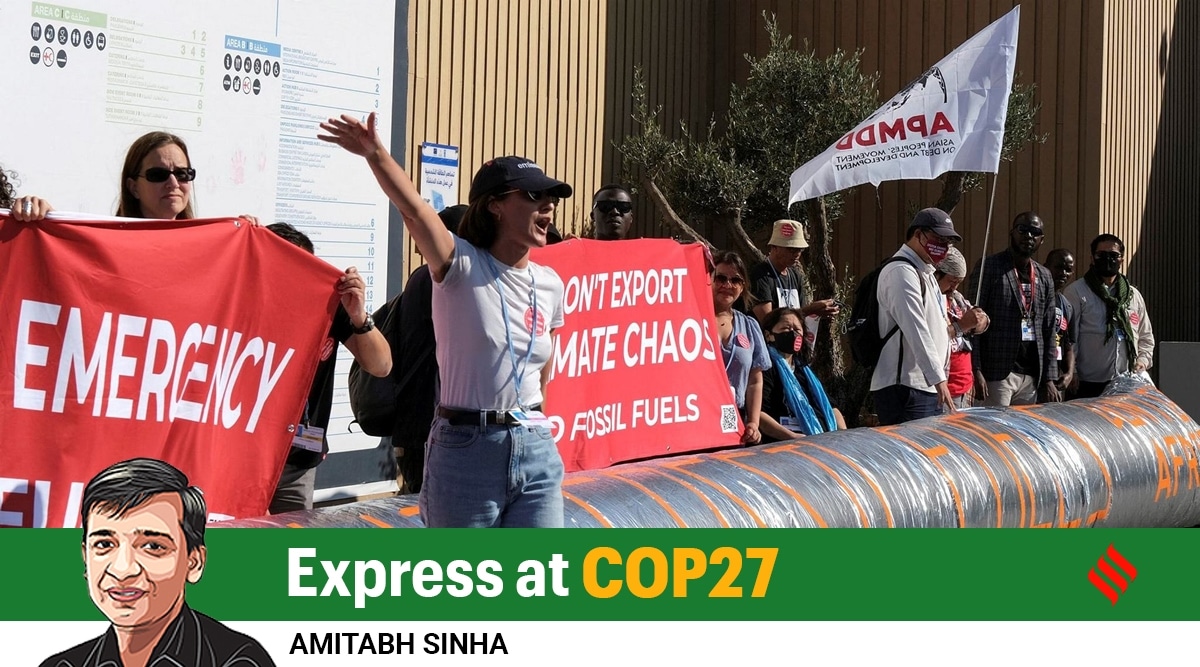Stay updated with the latest - Click here to follow us on Instagram
COP27: No resolution, climate talks to continue today
The EU has been repeatedly demanding that countries like China -- it has not mentioned India by name -- which is one of the strongest economies now, must be asked to share the financial burden of climate change.

THE EUROPEAN Union seemingly gave in to a key demand of the developing countries for setting up of a separate fund for loss and damage, but the unrealistic conditions attached to its support meant that it did nothing to break the stalemate at the climate change conference here, as talks went into extra-time.
The EU, initially hesitant to back the proposal, said late Thursday evening that it would be open to creation of a new fund but only if the money came from all the countries that were in a position to contribute, a condition clearly aimed at roping in large economies like China and India, but something that these countries are unlikely to agree to.
The EU has been repeatedly demanding that countries like China — it has not mentioned India by name — which is one of the strongest economies now, must be asked to share the financial burden of climate change. Both China and India reject such demands whenever it is raised.
But this is not the only condition EU put forward that other countries would find difficult to agree to. The EU has linked its support to loss and damage facility to greater emission reduction actions by all countries before 2030. More specifically, it has said that countries must agree to ensure that global emissions peak by 2025, and that the world must pursue efforts to restrict temperature rise to within 1.5 degree Celsius from pre-existing times. As of now, the goal of the Paris Agreement is to ensure that temperature rise is kept “well below” 2 degree Celsius, while making efforts to restrict it to 1.5 degree Celsius.
In addition, the EU has proposed more action on coal and methane, which can become a deal-breaker for countries like India. Taking the Glasgow promise of a “phasedown” of coal further, the EU has said countries must agree to “accelerate” the phase down “as soon as possible” and “submit roadmaps” and annual progress report towards this objective. It has also said that all the countries should sign on to a pledge to reduce their methane emissions by at least 30 per cent by 2030 compared to 2020 levels. Such a pledge was taken by about 100 countries at the Glasgow meeting last year. Till now about 150 countries have signed on. But some key countries with large dependence on the agriculture sector, including India, have stayed away. Methane emission is a sensitive subject in India because a large contribution comes from the agriculture and livestock sectors.
So, even while some developing countries welcomed the EU offer, saying it represented a forward movement, most have remained sceptical. Moreover, EU was not the only one resisting the proposal to set up a new loss and damage finance facility. The US continues to be opposed to it.
Some developing countries also see the EU proposal as a ploy to sow divisions in their ranks, since some of them are keenly looking forward for this fund. The EU proposal also makes it clear that the fund would be able to respond to the needs only of the “most vulnerable”. Usually, this refers to the Least Developed Countries (LDCs) and the small island developing states (SIDS). It is not clear whether a country like Pakistan, which has been in the forefront of the demand for this facility, would be able to access the money in this fund.
The tough, rather unworkable, conditions put forward by the EU meant that not much forward movement was achieved on Friday, originally the last day of the conference. So talks would continue on Saturday. Five informal ministerial groups, formed to bridge the differences on various issues, were still to submit their reports.
In a review meeting on Friday evening, India again made the point that singling out any one emissions source for a phase-down was not acceptable. India was reacting to a provision in the current draft decision which reintroduced the word “phase-out” in the context of coal-based power that India had fought hard in Glasgow to replace with “phase-down”.
Meanwhile, India has strongly opposed provisions that open up calls for emissions from agriculture to be reduced. There is a separate track of negotiations on agriculture that discusses the kinds of climate-related interventions needed in the sector. Emissions from agriculture, and land-use changes, is a sensitive subject for India and a large number of other developing countries.
“By seeking to extend the scope of mitigation to agriculture, the developed countries are wanting the world agriculture, lands and seascapes, to become a site of mitigation for their profligate, excessive emissions… As is well known to the world, and understood even in lay parlance, agriculture will be the hardest hit by climate change and is thus predominantly a site for adaptation,” India said.
“The developed countries are blocking a pro-poor, pro-farmer decision by insisting on expanding the scope for mitigation in agriculture, thereby compromising the very foundation of food security in the world. At every climate conference, the developed countries wish to change the goalposts of international climate regime, using diversionary means to dilute their responsibilities arising from their historical emissions,” it argued.